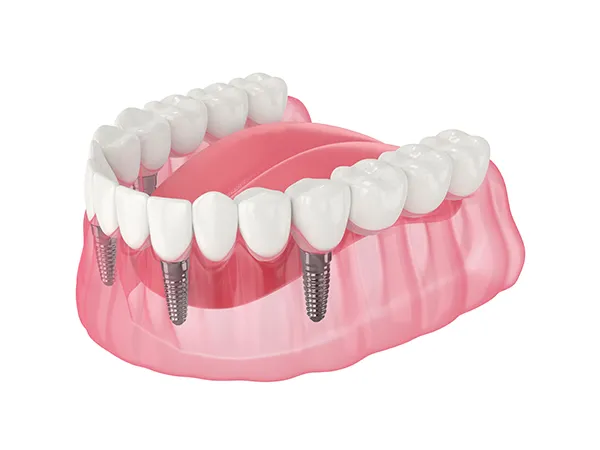 Implant supported bridges are a crucial solution for tooth loss in restoration dentistry. These bridges offer a lifelike replacement, addressing both the aesthetic and functional aspects of a complete smile. These implant supported bridges play a pivotal role in restoring dental health.
Implant supported bridges are a crucial solution for tooth loss in restoration dentistry. These bridges offer a lifelike replacement, addressing both the aesthetic and functional aspects of a complete smile. These implant supported bridges play a pivotal role in restoring dental health.Understanding Implant Supported Bridges
Implant supported bridges serve as an advanced and effective solution in restorative dentistry. These bridges are designed to replace missing teeth by utilizing dental implants as a sturdy foundation. Unlike traditional bridges that rely on adjacent natural teeth for support, implant supported bridges anchor to dental implants, providing a more stable and durable solution.
The key components of implant supported bridges include dental implants, abutments, and the bridge itself. Dental implants are surgically placed into the jawbone, mimicking the function of natural tooth roots. Abutments connect the implants to the dental bridge, acting as connectors between the prosthetic and the implant.This advanced approach to dental restoration ensures that patients not only regain their smiles but also experience improved functionality and long-term oral health.
We are proud to offer dental implants for implant supported bridges to our patients here in Charleston at Mountain State Oral and Facial Surgery.
The Implant Supported Bridge Process
Implant supported bridges involve a well-structured process that begins with an initial consultation and concludes with the placement of the prosthetic bridge. The journey towards an implant supported bridge starts with a thorough examination and consultation. During this phase, your oral surgeon will evaluate your oral health, review your medical history, and discuss individual goals and expectations.
X-rays or scans may be taken to assess bone density and determine the suitability for dental implants.
Surgery
Once the assessment is complete, the next step involves the surgical placement of dental implants. Skilled oral surgeons or implant specialists carefully position the implants into the jawbone.
These implants act as artificial tooth roots and serve as a robust foundation for the bridge. The number of implants depends on the specific case, with multiple implants strategically positioned for optimal support.After a healing and osseointegration period, during which the implants fuse with the jawbone, the process moves to the fabrication of the implant-supported bridge.
Impressions are taken to ensure a precise fit. The bridge, consisting of prosthetic teeth and connectors, is custom-made to match the patient's natural teeth in size, shape, and color. Once ready, the bridge is securely attached to the implants, completing the restoration.
This meticulous process ensures that the implant supported bridge not only functions seamlessly but also blends in with the patient's natural dentition, providing a reliable and aesthetic solution for individuals experiencing tooth loss.
Benefits of Implant-Supported Bridges
There are many benefits that come with choosing Implant supported bridges, including:
Aesthetic Improvements and Natural-Looking Results
Implant supported bridges blend well with natural teeth, offering a lifelike appearance.
Customized prosthetic teeth match the color, size, and shape of existing dentition for a harmonious smile.
Functional Advantages for Chewing and Speaking
These bridges, anchored to dental implants, provide enhanced stability and functionality.
Patients can confidently bite, chew, and speak without concerns about shifting or slipping.
Preservation of Surrounding Natural Teeth and Jawbone
Implant supported bridges eliminate the need to alter neighboring healthy teeth, preserving natural dentition.
The implants stimulate the jawbone, preventing bone loss associated with tooth loss.
Improved Oral Health
By preventing bone resorption, implants contribute to improved oral health. Unlike removable dentures, implant supported bridges don't cause gum irritation, promoting overall well-being.
Long-Term Durability and Reliability
Fusing with the jawbone through osseointegration, implants create a stable foundation. With proper care, implant supported bridges can last for years, providing a reliable tooth replacement solution.
Enhanced Comfort and Confidence
The secure fit and natural feel of implant supported bridges increase comfort and confidence. Patients can enjoy a varied diet without restrictions, supporting overall health.
Prevention of Facial Changes
Implant supported bridges help prevent facial changes associated with tooth loss. The restoration of a stable dentition contributes to maintaining facial aesthetics.
Aftercare and Maintenance
 Following the completion of the implant supported bridge procedure, patients can expect a brief post-restoration recovery period. During this time, it's normal to experience some discomfort or swelling, which can be managed with prescribed medications and proper care.Maintaining optimal oral hygiene practices is crucial for the long-term success of implant supported bridges. Regular brushing, flossing, and the use of antimicrobial mouthwash help prevent plaque buildup around the dental implants and bridge.
Following the completion of the implant supported bridge procedure, patients can expect a brief post-restoration recovery period. During this time, it's normal to experience some discomfort or swelling, which can be managed with prescribed medications and proper care.Maintaining optimal oral hygiene practices is crucial for the long-term success of implant supported bridges. Regular brushing, flossing, and the use of antimicrobial mouthwash help prevent plaque buildup around the dental implants and bridge. How To Care For Your Implant Supported Bridge
Patients should follow the specific care instructions provided by their dental care team to ensure the preservation of both the implants and surrounding natural teeth.Regular check-ups and maintenance appointments are recommended to monitor the health of the implant supported bridge.
Dental professionals will assess the stability of the implants and the condition of the bridge to address any emerging concerns promptly. These routine visits play a vital role in ensuring the continued functionality and longevity of the implant supported bridge.
Choosing the Right Provider for Implant Supported Bridges
When selecting a provider for implant supported bridges, various factors should be taken into consideration. It's essential to choose a provider with expertise in restorative dentistry and a proven track record in successfully delivering implant supported solutions.Clear communication is key during the consultation process.
Patients should feel confident in discussing their expectations, and the chosen provider should offer personalized treatment plans tailored to individual needs. This collaborative approach ensures that the implant supported bridge aligns with the patient's desired outcomes.
FAQs
What is an implant-supported bridge?
An implant-supported bridge is a dental restoration that replaces multiple missing teeth using dental implants as a stable foundation. Unlike traditional bridges that rely on adjacent natural teeth for support, implant-supported bridges are anchored directly to implants embedded in the jawbone, providing enhanced stability and durability.
Who is a candidate for an implant-supported bridge?
Candidates for implant-supported bridges are individuals with multiple missing teeth who have sufficient jawbone density to support implants. If bone loss is present, bone grafting may be required. A thorough examination by a dental professional will determine your eligibility for this treatment.
What are the benefits of implant-supported bridges compared to traditional bridges?
Implant-supported bridges offer several advantages over traditional bridges, including improved stability, no need to alter adjacent healthy teeth, prevention of jawbone loss, and a more natural look and feel. They also provide long-term durability with proper care.
How long does the process take for an implant-supported bridge?
The process for an implant-supported bridge typically takes several months. This includes initial consultations, implant placement, a healing period for osseointegration (where the implants fuse with the jawbone), and the fabrication and attachment of the custom bridge.
How do I care for my implant-supported bridge?
Caring for an implant-supported bridge involves maintaining good oral hygiene, including regular brushing, flossing, and using an antimicrobial mouthwash. Routine dental check-ups are essential to monitor the health of the implants and bridge, ensuring long-term success.
What is the recovery process like after receiving an implant-supported bridge?
Recovery after receiving an implant-supported bridge includes some swelling and discomfort, which can be managed with prescribed medications. Full healing may take several months as the implants integrate with the jawbone. Following aftercare instructions and attending follow-up appointments are crucial for a smooth recovery.
Implant Bridge Charleston WV
Contact Mountain State Oral and Facial Surgery at 304-343-5161 to schedule an appointment with one of our dental implant experts at a location near you.

